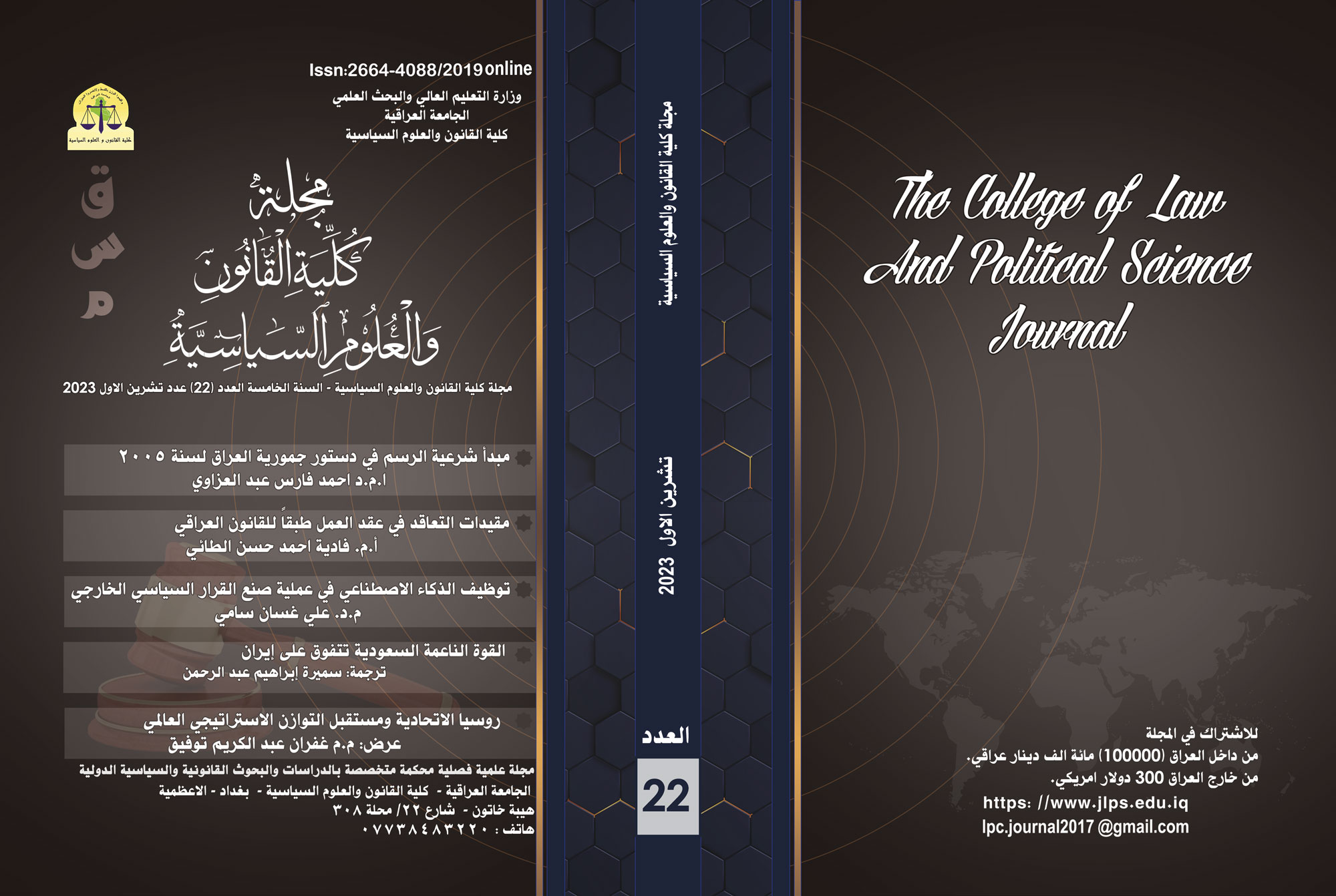تأثير الادارة المشتركة للموارد المائية لحوضي دجلة والفرات في امن واستقرار العراق
DOI:
https://doi.org/10.61279/g46n3c18الكلمات المفتاحية:
حوضي دجلة والفرات ، تركيا وايران ، ادارة مشتركةالملخص
المصدران الرئيسان للمياه العراقية، هما نهرا: دجلة والفرات، اللذان يمدان (98٪) من المياه السطحية للبلاد. ينبع كلا النهرين من تركيا، ويتدفق نهر الفرات عبر سوريا، وبعض الروافد الأخرى تتدفق عبر إيران. كان العراق حتى السبعينيات يعدّ دولة غنية بالمياه، ولكن منذ أن بدأت تركيا في بناء السدود على النهرين، قللت بشكل كبير من موارد العراق المائية. إذ بدأت الحكومة التركية مشروع جنوب شرق الأناضول، ببناء (22) سداً و (19) محطة طاقة هيدروليكية للمقاطعات النامية في الجنوب الشرقي، وكانت مترددة في التفاوض بشأن صفقة مياه مع العراق وسوريا. تركيا لديها القدرة على قطع تدفق المياه في اتجاه مجرى النهر على المدى القصير، مع تقليل إمدادات المياه الإجمالية في العراق. على سبيل المثال، في التسعينيات، رفعت تركيا مستوى المياه في سد أتاتورك دون علم سوريا والعراق. كما أدت سياسات قطاع المياه في إيران إلى تقليص إمدادات المياه في العراق. إذ إنَّ الروافد التي تنبع من إيران توفر (40٪) من مياه شط العرب (نهر الوند) في العراق، وكان لبناء السد تأثير مدمر في تدفق المياه إلى المحافظات الشرقية من العراق. ومع بناء (600) سد في إيران والمزيد من التخطيط، تم تحويل مياه الأنهار مثل كارون والكرخة للبقاء في إيران، ولم تعد تتدفق إلى العراق. هذه الانحرافات في المسار لم تقلل من تدفق المياه إلى العراق فحسب، بل أدت أيضًا إلى زيادة ملوحة المياه. ففي محافظة البصرة وحدها، تم إدخال (118) ألف شخص إلى المستشفى في صيف 2018، بسبب مشكلات صحية تتعلق بجودة المياه. بالنظر إلى المستقبل، من المتوقع أن يجف نهرا: دجلة والفرات داخل العراق بحلول عام 2040 بسبب سياسات المياه لجيرانه، ويبدو أنَّه ليس ثمة حلول امام العراق سوى اللجوء الى المفاوضات مع دول المنبع والاتفاق على ادارة متكاملة لمياه الحوضين (دجلة والفرات) من اجل ديمومة المياه، والمحافظة على امن واستقرار البلاد.
التنزيلات
المراجع
Mahmud Ali Aykan, Turkish perspective on Turkish U S relations concerning Persian Gulf security in the post –cold war ,1989,1995, the middle East journal volume 50,N3. 19
Hossam Shehadeh, The Place of Water in the Arab-Israeli Conflict: From a Future Perspective, 1st edition, Al Jazeera Center for Studies, Doha, 2009, p. 101.
Adnan Belloni, Arab Water Security, Ishtar Magazine, Issue 6/2006, p. 10.
Scott Peterson, what could float-or sink-peacemaking, Christian Science Monitor, july14, 1999. P.10: Mohamed Aly Ayuh et Uerich Kulfer; “water management in the Maghreb finance et development”, June 1994, p.p28- 29
Falkenmark, M. and Lindh G. ' Water and economic development, ' in Gleick p. (Ed.) Water in Crisis, OUP, Oxford, 1993, p109.
Sahib Al-Rubaie, “Integrated Water Resources Management”, Damascus, 2003, p. 124.
Waheed Ali Mujahid and others, A Study to Evaluate the Impact of Economic Reform Policies on the Use of Irrigation Water in the Arab World, League of Arab States, Arab Organization for Agricultural Development, Khartoum, 1998, p. 36
Muhammad Awad Al-Hazaima, International Issues, The Legacy of a Century That Past and the Load of a Century that Came, 1st edition, Amman, 2005, p. 93.
Dalia Ismail Muhammad, Water and International Relations: A Study of the Impact of the Water Crisis on the Nature and Pattern of Arab-Turkish Relations, 1st edition, Arab Printing and Publishing, Cairo, 2006, p. 23.
Peter Rogers and Peter Lydon, Water in the World: Prospects and Possibilities for the Future, translated by Shawqi Jalal: 1st edition, UAE, Center for Strategic Studies and Research 21, 1997, pp. 421-42.
Scott Peterson, what could float-or Sink-Peacemaking, Christian Science Monitor, july14, 1999. P.10: Mohamed Aly Ayuh et Uerich Kulfer; “water management in the Maghreb finance et development”, June 1994, pp28, 29
Arab Organization for Agricultural Development, Arab Food Security Conditions, 2011, p. 10, available at the electronic link: http://www.aoad.org/Arab_food_security_report_%202011.pdf
Peter Rogers and Peter Lydon, Water in the World: Prospects and Possibilities for the Future, translated by Shawqi Jalal: 1st edition, UAE, 1997, pp. 421-42.
Allan, J. A. (ed), Water, peace, and the Middle East: Negotiating Resources in the Jordan Basin, library of modern Middle East studies9, London Tauris Academic studies, 1996, p.p6-9
Arab-Turkish relations, a future dialogue, research and discussions of the intellectual symposium organized by the Center for Arab Unity Studies, 1st edition, Beirut, 1995, p. 157.
Kanaan Abdul-Jabbar Abu Kalal, The scarcity of water resources in Iraq - causes and solutions, Iraqi Forum for Elites and Competencies. Available at the following electronic link:
Ahmed Muhammad Al-Samarrai, The Euphrates River between Turkish Occupation and Zionist Ambitions, House of Cultural Affairs, first edition, Baghdad, 2001, p. 77.
Refaat Sayed Ahmed, The Water Conflict: The Full Dimensions of the Conflict over Water between Arabs and Israel, Reality and Future, 1st edition, Al-Ahram Publishing and Distribution Foundation, Cairo, 1993, p. 15.
Hanan Badawi and Hanan Al-Samni, The Dangers of the Renaissance Dam at the Discussion Table of the Egyptian Forum for Sustainable Development, Arab Network for Environment and Development, July 2013. Available at the following electronic link: www.readnet work.org
Mohamed Aly Ayuh et Uerich Kulfer, “water management in the Maghreb finance et development”, June 1994, p.p28-29
Biswas.ed, international waters of the Middle East: from Euphrates. Tigris to Nile, p.p2-4
Collins Robert. D, the water of the Nile- Hydropolitics and the jonglei canal 1900-1991, clarendo press .Oxford, 1990. P.23
منشور
إصدار
القسم
الفئات
الرخصة
الحقوق الفكرية (c) 2023 مجلة كلية القانون والعلوم السياسية

هذا العمل مرخص بموجب Creative Commons Attribution-NonCommercial-NoDerivatives 4.0 International License.

